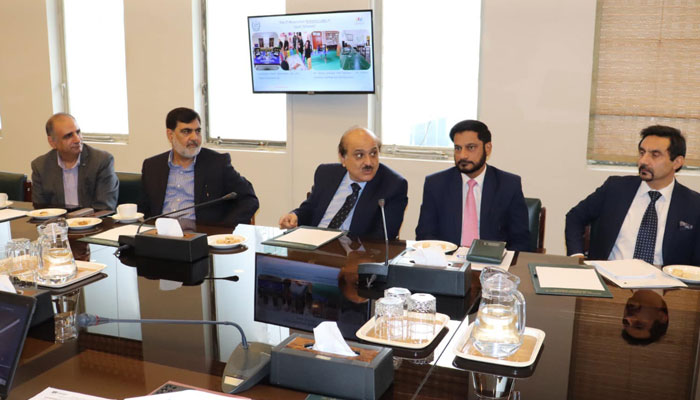Ministry to roll out smart classrooms to improve digital education
Islamabad : The Ministry of Federal Education and Professional Training, in partnership with United Nations Educational Scientific and Cultural Organisation Pakistan, has decided to improve digital education for girls in the Azad Jammu and Kashmir and Gilgit-Baltistan regions by introducing smart classrooms, insisting that the initiative will enhance educational opportunities for girls in marginalised communities.
Under the decision, which was made in a meeting chaired by federal education secretary Mohyuddin Ahmad Wani and attended by senior ministry officials and Unesco education team, advanced IT equipment will be installed in 80 government girls’ schools.
The secretary emphasised the initiative's significance in addressing educational disparities in remote regions of Pakistan. "This transformative project is poised to bring smart classroom technology to primary-level girls, equipping schools in eight AJK and GB districts with state-of-the-art IT resources," he said.
Mr Wani said that smart classrooms utilised interactive tools, digital content, and personalised learning interfaces that allowed learners to engage with their curriculum in dynamic and meaningful ways. "By integrating these advanced tools, young girls in these regions will benefit from an improved learning environment that fosters creativity, critical thinking, and problem-solving skills," he said.
The education secretary said that the initiative also included a customised capacity development programme for teachers, enabling them to integrate technology into teaching and learning process effectively. He said the programme would prepare teachers to integrate AI-enabled tools into their instructional methods, streamlining the teaching-learning process to ensure that students gain maximum benefit.
Wani said that training local educators was key to making this transition successful, as it empowered them to create an inclusive and supportive learning environment that met the unique needs of primary school girls in AJK and GB. “This is a valuable gift for the girls of these marginalised areas. The new equipment and capacity building of teachers will open doors for young girls to access a world-class education regardless of their location, and it underscores our commitment to equitable and inclusive education,” he said.
The secretary said that the deployment of IT equipment in schools and the training programme for teachers showed the education ministry and Unesco’s shared vision for an innovative and inclusive educational system in Pakistan. "Through these efforts, the girl students of AJK and GB stand to gain the knowledge and skills needed to thrive in an increasingly digital world," he said.
-
 JoJo Siwa Shares Inspiring Words With Young Changemakers
JoJo Siwa Shares Inspiring Words With Young Changemakers -
 James Van Der Beek Loved Ones Breaks Silence After Fundraiser Hits $2.2M
James Van Der Beek Loved Ones Breaks Silence After Fundraiser Hits $2.2M -
 Disney’s $336m 'Snow White' Remake Ends With $170m Box Office Loss: Report
Disney’s $336m 'Snow White' Remake Ends With $170m Box Office Loss: Report -
 Travis Kelce's Mom Donna Kelce Breaks Silence On His Retirement Plans
Travis Kelce's Mom Donna Kelce Breaks Silence On His Retirement Plans -
 Premiere Date Of 'Spider-Noir' Featuring Nicolas Cage Announced
Premiere Date Of 'Spider-Noir' Featuring Nicolas Cage Announced -
 Pedro Pascal's Sister Reveals His Reaction To Her 'The Beauty' Role
Pedro Pascal's Sister Reveals His Reaction To Her 'The Beauty' Role -
 Kate Middleton Proves She's True 'children's Princess' With THIS Move
Kate Middleton Proves She's True 'children's Princess' With THIS Move -
 Paul Anka Reveals How He Raised Son Ethan Differently From His Daughters
Paul Anka Reveals How He Raised Son Ethan Differently From His Daughters -
 'A Very Special Visitor' Meets Queen Camilla At Clarence House
'A Very Special Visitor' Meets Queen Camilla At Clarence House -
 Jodie Turner Smith Shares One Strict Rule She Follows As A Mom
Jodie Turner Smith Shares One Strict Rule She Follows As A Mom -
 Hailey Bieber Reveals KEY To Balancing Motherhood With Career
Hailey Bieber Reveals KEY To Balancing Motherhood With Career -
 Photo Of Jay-Z, Other Prominent Figures With Jeffrey Epstein Proven To Be Fake
Photo Of Jay-Z, Other Prominent Figures With Jeffrey Epstein Proven To Be Fake -
 Hillary Clinton's Munich Train Video Sparks Conspiracy Theories
Hillary Clinton's Munich Train Video Sparks Conspiracy Theories -
 Fans Slam Talk Show Host For 'cringe' Behavior In Chris Hemsworth Interview
Fans Slam Talk Show Host For 'cringe' Behavior In Chris Hemsworth Interview -
 Woman Jailed Over False 'crime In Space' Claim Against NASA Astronaut
Woman Jailed Over False 'crime In Space' Claim Against NASA Astronaut -
 James Van Der Beek’s Close Pal Reveals Family's Dire Need Of Donations
James Van Der Beek’s Close Pal Reveals Family's Dire Need Of Donations




